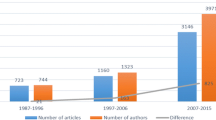Abstract
We use some modern scientometrics tools to detect which articles written in co-authorship are the most influential in the finance theory literature from 1896 to 2006. To develop a rank of these most cited and influential co-authorships, we use four metrics of complex network statistics: the weighted degree (the sum of weighted indegree and weighted out-degree) and the PageRank™. The database was obtained from bibliographies selected by two historians of economic-financial thought: Gonçalo Fonseca and Peter Bernstein. The first is responsible for the largest international website about the History of Economic Thought—The History of Economic Thought of the Institute for New Economic Thinking. The second wrote the seminal book History of the Capital Market, which describes what the author called "capital ideas" of the literature about Finance and Capital Markets. The results classified, in descending order - arranged in complex networks and tables - which co-authorships were most relevant in the finance theory literature in the mentioned period.

Similar content being viewed by others
Notes
We chose the number of Google Scholar citations as the weight of links (edges) in the network only for reasons of suitability for the PageRank methodology. However, such edges could be weighted by citation weights from other academic databases such as Scopus and Web of Science (WoS). We believe that our results, in general terms, would be maintained with the use of these other databases, because historians selected seminal works. But we leave this assessment for future research that eventually test to what extent our results maintain or change.
References
Abbasi, A., Hossain, L., Uddin, S., & Rasmussen, K. (2011). Evolutionary dynamics of scientific collaboration networks: multi-levels and cross-time analysis. Scientometrics, 89(2), 687–710.
Amine, A. PageRank algorithm fully explained. Dec. 19, 2020. Retrieved August 12, 2021 from https://towardsdatascience.com/pagerank-algorithm-fully-explained-dc794184b4af
Bernstein, P. L. (2007). Capital ideas evolving (1st ed.). Wiley.
Bernstein, P. L. (2008). A primer on money, banking, and gold (Peter L. Bernstein's Finance Classics). John Wiley & Sons.
Bonacich, P. (1987). Power and centrality: A family of measures. The American Journal of Sociology., 92(5), 1170–1182.
Chen, C. (1999). Visualising semantic spaces and author co-citation networks in digital libraries. Information Processing & Management, 35(3), 401–420.
Cheng, Q., Wang, J., Lu, W., et al. (2020). Keyword-citation-keyword network: A new perspective of discipline knowledge structure analysis. Scientometrics, 124, 1923–1943. https://doi.org/10.1007/s11192-020-03576-5
Di Bella, E., Gandullia, L., & Preti, S. (2021). Analysis of scientific collaboration network of Italian Institute of Technology. Scientometrics, 126, 8517–8539. https://doi.org/10.1007/s11192-021-04120-9
Fonseca, G. L. (2021). History of economic thought website. Website: http://www.hetwebsite.net/het/fonseca/personal.htm
Frobenius, G. (1912). Ueber Matrizen aus nicht negativen Elementen, Sitzungsberichte der Königlich Preussischen Akademie der Wissenschaften. pp. 456–477.
Fruchterman, J., & Reingold, M. (1991). Graph drawing by force-directed placement. Software: Practice and Experience, 21(11), 1129–1164.
Kumar, R. (2017). Strategic financial management casebook. Elsevier.
Maltseva, D., & Batagelj, V. (2021). Journals publishing social network analysis. Scientometrics, 126, 3593–3620. https://doi.org/10.1007/s11192-021-03889-z
Pegg, E., Rowland, T. and Weisstein, E. W. "Cayley graph". Mathworld--a wolfram web resource. Retrieved August 3, 2021, from http://mathworld.wolfram.com/CayleyGraph.html
Perron, O. (1907). Zur Theorie der Matrices. Mathematische Annalen, 64(2), 248–263. https://doi.org/10.1007/BF01449896,hdl:10338.dmlcz/104432,S2CID123460172
Rutledge, R., & Karim, K. (2009). Determinants of co-authorship for the most productive authors of accounting literature. Journal of Education for Business, 1984, 130–134.
Tian, S., Xu, X., & Li, P. (2021). Acknowledgement network and citation count: The moderating role of collaboration network. Scientometrics, 126, 7837–7857. https://doi.org/10.1007/s11192-021-04090-y
Author information
Authors and Affiliations
Corresponding author
Ethics declarations
Conflict of interest
We declare that there is no conflict of interest involving this work.
Rights and permissions
Springer Nature or its licensor holds exclusive rights to this article under a publishing agreement with the author(s) or other rightsholder(s); author self-archiving of the accepted manuscript version of this article is solely governed by the terms of such publishing agreement and applicable law.
About this article
Cite this article
de Oliveira Passos, M., Gonzalez, P.L., Tessmann, M.S. et al. The greatest co-authorships of finance theory literature (1896–2006): scientometrics based on complex networks. Scientometrics 127, 5841–5862 (2022). https://doi.org/10.1007/s11192-022-04482-8
Received:
Accepted:
Published:
Issue Date:
DOI: https://doi.org/10.1007/s11192-022-04482-8







